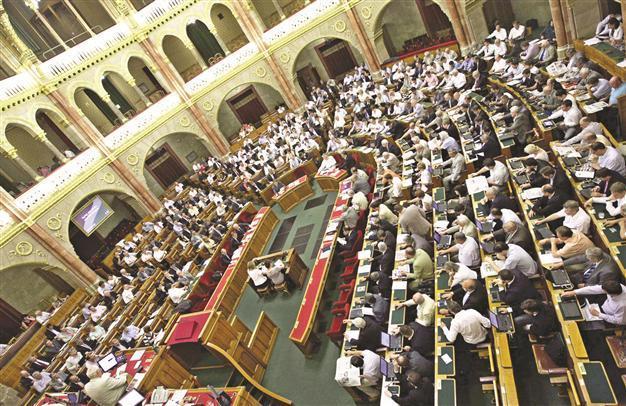Hungary prepares for tough IMF credit talks
BUDAPEST - Agence France_Presse

Hungarian MPs are seen votinhg at the Hungarian Parliament in Budapest in this June 6 photo, during the session of the new version of the Hungarian Central Bank law, after the EU criticized the old one. AFP photo
Hungary and the International Monetary Fund (IMF) will take a new stab at a 15-billion-euro credit line deal, starting tomorrow, following months of delay due to controversial central bank reforms.A delegation of representatives from the IMF and European Union (EU) is due to arrive in Budapest tomorrow for negotiations until July 25.
An earlier effort had ended in late December, when EU and IMF experts had walked out on credit talks with Budapest, citing reforms that they feared would limit the central bank’s independence.
The Hungarian government has since -reluctantly- revised its legislation, which received the European Central Bank’s approval in June.
However, conservative Prime Minister Viktor Orban has already warned the IMF-EU talks could go on for some time, predicting the core issues will only be discussed at the end of the summer.
“Those who are expecting quick negotiations will be disappointed,” he told Hir TV television last week.
Budapest hopes a 15-billion-euro ($18.2 billion) credit line from the IMF and EU will allow it to borrow on the bond market at better rates than the current ones -- on July 13, the yield on 10-year sovereign bonds reached 7.85 percent.
Hard to invest
Investors’ confidence in the country dipped as a result of the government’s unorthodox economic policies, including the nationalization of pension funds and crisis taxes on specific sectors, like telecommunications and banking.
Hungary also saw its debt downgraded to “junk” status by all three major credit-rating agencies, prompting bond rates to jump, while the national currency, the forint, grew weaker.
Still, Viktor Orban has been reluctant to comply with EU demands, sowing doubts as to his intentions. Economy Minister Gyorgy Matolcsy even chose to go on holiday at the exact same time the IMF will be in town. “The government seems to try to keep the IMF away from Hungary,” the economic research institute GKI observed in a recent analysis.
TURKISH GAME IN HUNGARY?
BUDAPEST - Reuters
Hungary’s minister in charge of IMF talks, Mihaly Varga, has said the government has repeatedly denied it was playing the same game as Turkey a few years ago. But there are striking similarities.
Turkey turned to the IMF after its previous standby accord expired in May 2008 and held stop-start talks with the Fund all through 2009, keeping its investors hoping for a deal. Hungary first announced it would seek an IMF deal last November. In the end, Turkey called off the talks in March 2010 after PM Tayyip Erdoğan said Turkey did not need the IMF’s help. In 2011, he was re-elected. But Turkey had strong growth potential. Hungary faces a potential debt trap. For the Hungarian prime minister, domestic political considerations will likely overrule other factors, said Mujtaba Rahman, an analyst at Eurasia group.
















